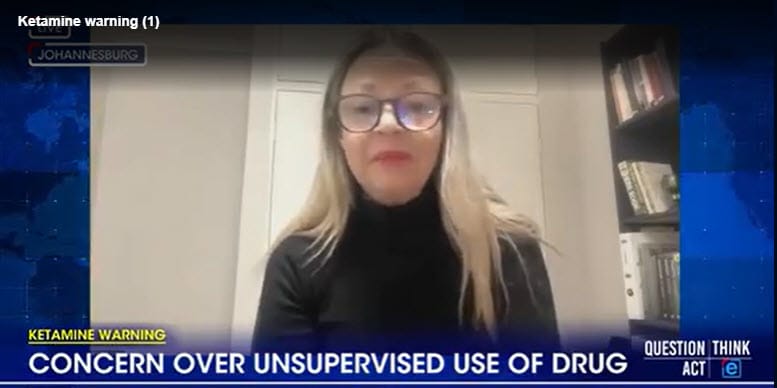Expert Insight: Dr. Melane van Zyl on the Risks of Recreational Ketamine and SASOP’s Call for Caution
Ketamine Therapy: A Double-Edged Sword in Mental Health
In an era where mental health treatments are rapidly evolving, the line between innovative therapy and risky experimentation can blur. Dr. Melane van Zyl, a leading South African psychiatrist and spokesperson for the South African Society of Psychiatrists (SASOP), is raising urgent concerns about the recreational misuse of ketamine and its unregulated use in private clinics. In an exclusive interview with eNCA News (DStv Channel 403), Dr. van Zyl highlights SASOP’s latest warnings and guidelines to protect patients from the dangers of unsupervised ketamine use.
Ketamine, a powerful anesthetic drug registered in South Africa for surgical use, has gained attention for its off-label application in treating severe depression. Dr. van Zyl acknowledges its potential: “Ketamine has a rapid antidepressant effect, offering hope for those with treatment-resistant depression (TRD). However, this is not a miracle cure—it’s a tightly controlled medical intervention.”
While intravenous (IV) ketamine shows promise for TRD under strict guidelines, SASOP warns that its misuse outside clinical settings is alarming. Recreational use, often in unsupervised environments, poses significant risks, including addiction, cognitive impairment, and psychological harm. Worse, private clinics are increasingly offering ketamine therapies without adhering to evidence-based protocols.
SASOP’s Stance: Safety Over Speculation
In collaboration with the South African Society of Anaesthesiologists (SASA), SASOP has released a joint position statement to address growing concerns:
- TRD Requires Specialist Care: Treatment-resistant depression must be diagnosed and managed by psychiatrists (Level 2-7 care). Only specialists can determine if ketamine is appropriate after traditional therapies fail.
- Administration Matters: IV ketamine should only be administered by anesthetists or GPs with anesthesia training, in settings equipped for emergencies.
- No Evidence for Alternatives: Intramuscular (IM), subcutaneous (SC), or oral ketamine lack sufficient research support.
- Psychedelic Agents Are Illegal: SASOP and SASA strongly condemn the use of unregulated psychedelics like psilocybin or MDMA, which remain prohibited under South African law.
Dr. van Zyl emphasizes, “Ketamine isn’t a quick fix. Without proper diagnosis, monitoring, and follow-up by a psychiatrist, patients risk worsening their condition or facing life-threatening side effects.”
The Rise of “Ketamine Clinics”: A Red Flag
The surge in private clinics promoting ketamine as a cure-all for mental health disorders has SASOP deeply concerned. Many bypass critical safeguards:
- Misdiagnosis: Patients without TRD receive ketamine, often after inadequate psychiatric evaluation.
- Lack of Follow-Up: The antidepressant effects of ketamine fade over time, yet clinics rarely provide long-term care plans.
- Ethical Violations: Advertisements on social media and unregulated platforms contravene SAHPRA regulations, which prohibit promoting off-label ketamine use.
“This isn’t just irresponsible—it’s dangerous,” says Dr. van Zyl. “Psychologists or GPs recommending ketamine without psychiatrist involvement are operating outside their scope, endangering patients and opening themselves to legal consequences.”
A Unified Call for Regulation of Ketamine
SASOP and SASA urge healthcare providers to adhere strictly to guidelines:
- Psychiatrists must lead TRD diagnosis and referrals.
- Anesthetists should oversee ketamine administration, ensuring patient safety during and after treatment.
- Illegal psychedelic use must be reported to uphold ethical standards.
Dr. van Zyl stresses collaboration: “Patient safety hinges on teamwork between psychiatrists, anesthetists, and GPs. Breakdowns in communication help no one—least of all vulnerable patients seeking relief.”
Watch the Full Interview
For deeper insights, watch Dr. Melane van Zyl’s interview with eNCA News below, where she discusses SASOP’s warnings, the science behind ketamine, and why South Africa must prioritize ethical mental healthcare.
Knowledge is Protection
As ketamine gains popularity, public education is vital. Dr. van Zyl and SASOP advocate for informed decisions: “If you’re considering ketamine, consult a psychiatrist first. Ensure your provider follows SASA and SASOP guidelines. Your mental health deserves evidence-based care—not experimentation.”
About Dr. Melane van Zyl:
Dr. Melane van Zyl is a renowned psychiatrist and spokesperson for the South African Society of Psychiatrists (SASOP). Specializing in mood disorders and treatment-resistant depression, she advocates for ethical, evidence-based mental health practices across South Africa.
CREDITS
JOHANNESBURG – The South African Society of Psychiatrists is warning against the recreational use of Ketamine.
It says the powerful drug is being used in unsupervised settings and is very dangerous.
The society is also worried about an increase in the number private clinics offering Ketamine treatment.
Melané van Zyl said ketamine has an anti-depressant effect.
“SASOP has written a position statement with the anaesthetist society to give guidance on how ketamine should be given,” she said.
Tune into eNCA for more.
SUMMERY
Dr. Melane van Zyl, a prominent psychiatrist and spokesperson for the South African Society of Psychiatrists (SASOP), warns against the recreational and unregulated clinical use of ketamine, emphasizing its risks despite its potential as a treatment for severe depression. In an interview with eNCA News, she highlights SASOP’s joint guidelines with the South African Society of Anaesthesiologists (SASA), stressing that ketamine should only be administered intravenously for treatment-resistant depression (TRD) under strict supervision. Key points include:
-
Specialist oversight: TRD must be diagnosed and managed by psychiatrists, with ketamine administered solely by trained anesthetists in controlled settings.
-
Risks of misuse: Recreational use and unregulated clinics bypass critical safeguards, risking addiction, misdiagnosis, and inadequate follow-up.
-
Illegal psychedelics: SASOP condemns the use of unapproved substances like psilocybin or MDMA, which remain prohibited under South African law.
Dr. van Zyl urges public caution, advocating for evidence-based care and adherence to SASOP/SASA guidelines to protect patient safety.


